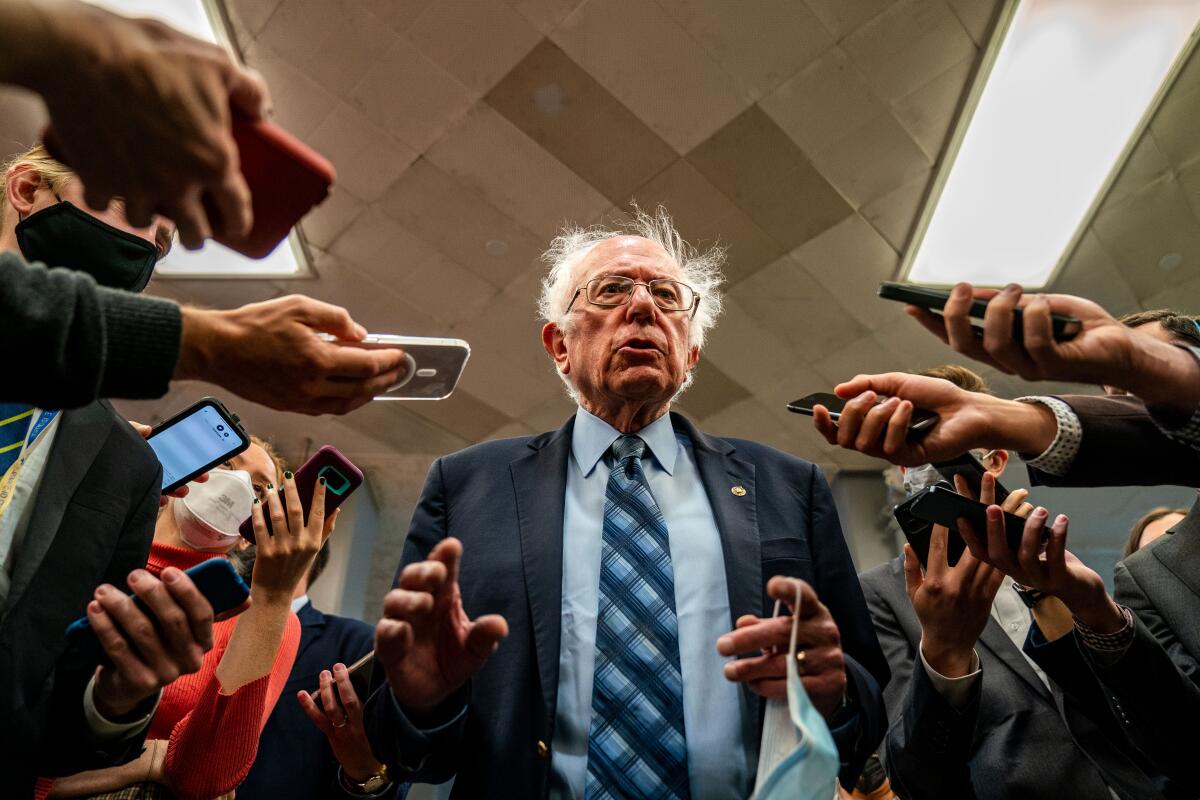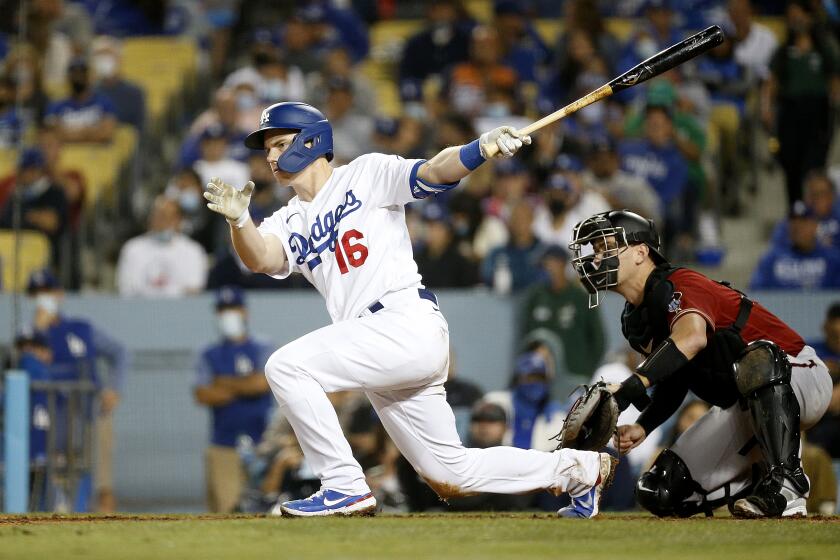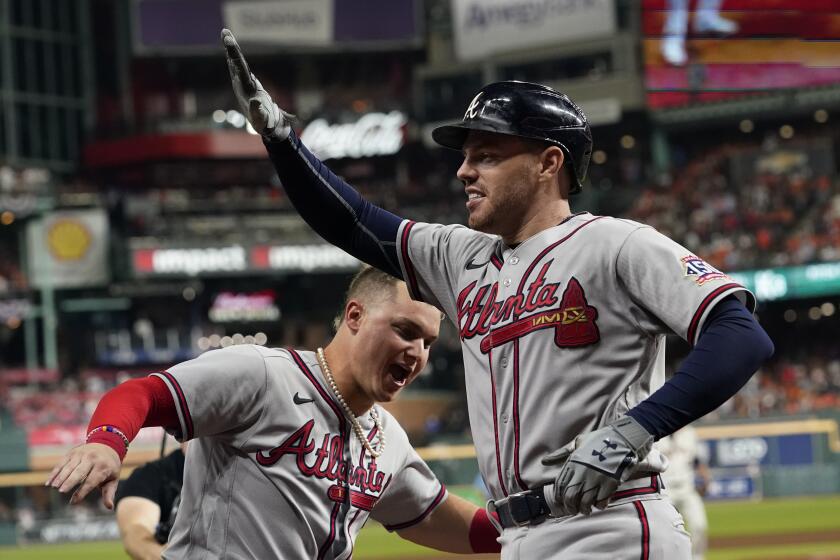News Analysis: MLB oligarchs? Sen. Bernie Sanders again takes aim at antitrust exemption

- Share via
There was joy in Mudville, at least for a couple hours Thursday. Owners and players made peace with one another. A full season of baseball would be played. Hurrah!
Then a Bernie Sanders email hit the inbox with a blistering statement in which the Vermont senator labeled the owners as “baseball oligarchs” seven times in 12 sentences and vowed to pursue stripping Major League Baseball of its cherished antitrust exemption.
“It would be wrong for Congress to simply celebrate today’s agreement and move on,” Sanders said in the statement. “We must prevent the greed of baseball’s oligarchs from destroying the game.”
The word “oligarchs” stuck out. In the current context, oligarchs are what we call Vladimir Putin’s cronies, the ones trying to rush their yachts into a safe harbor before the sanctions police can seize them.
Is that the image Sanders believes fans should associate with baseball’s owners?
“No, no, no,” he told me. “By oligarch, I mean people with incredible power and incredible wealth who are using that power to enrich themselves rather than benefit ordinary people.”
Spring training will look markedly different after losing a month because of the lockout. How MLB players prepared on their own will be evident.
Sanders means those who stripped affiliated minor league teams from 43 communities, including his hometown of Burlington, Vt. He means securing an exemption from having to pay minor league players according to minimum wage laws. He means collecting subsidies from taxpayers to build stadiums.
In his statement, he also blamed owners for negotiating “in bad faith for more than 100 days in a blatant attempt to break the players’ union.” That might be, but the Senate could have prevented the lockout in the first place, by passing a bill that Sanders’ colleagues declined even to bring up for a vote. The bill has remained buried in the Senate for more than a year.
The antitrust exemption allows baseball to control where its teams play. If the Oakland Athletics and Tampa Bay Rays cannot get new ballparks and decide to move, MLB alone makes the call. The NFL does not have an antitrust exemption, which factored into St. Louis winning $790 million after the Rams’ move to Los Angeles.
Since 1950, according to Indiana University professor Nathaniel Grow, Congress has held more than 60 hearings to debate the MLB antitrust exemption, never repealing it. In 2019, when Sanders and other members of Congress confronted MLB over the plan to eliminate minor league teams, Sanders told me “many, many members of the House and the Senate … are prepared to take a hard look” at the antitrust exemption.
The teams were eliminated. The antitrust exemption stands. Why should MLB owners be worried about losing the exemption now?
“We’re going to do the best we can,” he told me. “I’m not going to guarantee anything, but I think there is a lot of fan dissatisfaction with the role that these guys are playing.”
Sanders pledged to introduce a bill to end the antitrust exemption. When Congress truly is upset with MLB, the playbook generally calls for nationally televised hearings, with a public scolding in lieu of legislation.
Is the plan here to get commissioner Rob Manfred to Washington and onto a hot seat?
“We might, yes,” Sanders said. “That’s a good idea.”
The first day of post MLB lockout bliss resulted in a new deal for Clayton Kershaw and Trevor Bauer being put on administrative leave.
That might resonate with fans. In his statement, Sanders ripped owners for often “charging outrageously high prices for tickets that many working class families cannot afford.”
For the Dodgers’ first Cactus League weekend home game, a family of four would spend $100 just to attend — no seats, only a spot on the lawn, and food and drinks are extra — and get to see maybe one or two at-bats from Mookie Betts or Justin Turner.
On the day Manfred announced the first week of the regular season would be postponed, he also said this: “The concern about our fans is at the very top of our consideration list.”
The players union committed $1 million to a fund to help stadium workers affected by the lockout. MLB belatedly followed suit.
The players union committed $500,000 to support youth organizations in Arizona and Florida whose funding was affected by the abbreviated spring training schedule. MLB has not followed suit.
These are easy wins for MLB. On the day the lockout ended, Manfred and the owners should have unveiled the easiest win of all, and the one in the interest not only of the fans but of the owners themselves.
From the day he assumed office, Manfred has emphasized the importance of cultivating the next generation of fans. If you go to major league games as a kid, you are more likely to become a fan for life.
When the lockout ended, fans heard a lot of “thank you for your patience” refrains. Manfred should have said that, but also this: We need to do a better job attracting kids, so kids get in free this season.
The league would set minimum standards for availability, and then each team would decide how to implement the plan, including whether tickets would be distributed at the ballpark, online or through schools and Boys and Girls Clubs, or however. The Dodgers used to give free tickets to students with a straight-A report card. (The Baltimore Orioles already offer free tickets to kids.)
This would mean sacrificing a little short-term profit, in an already profitable industry, for long-term gain. An oligarch would not do that.
More to Read
Go beyond the scoreboard
Get the latest on L.A.'s teams in the daily Sports Report newsletter.
You may occasionally receive promotional content from the Los Angeles Times.













